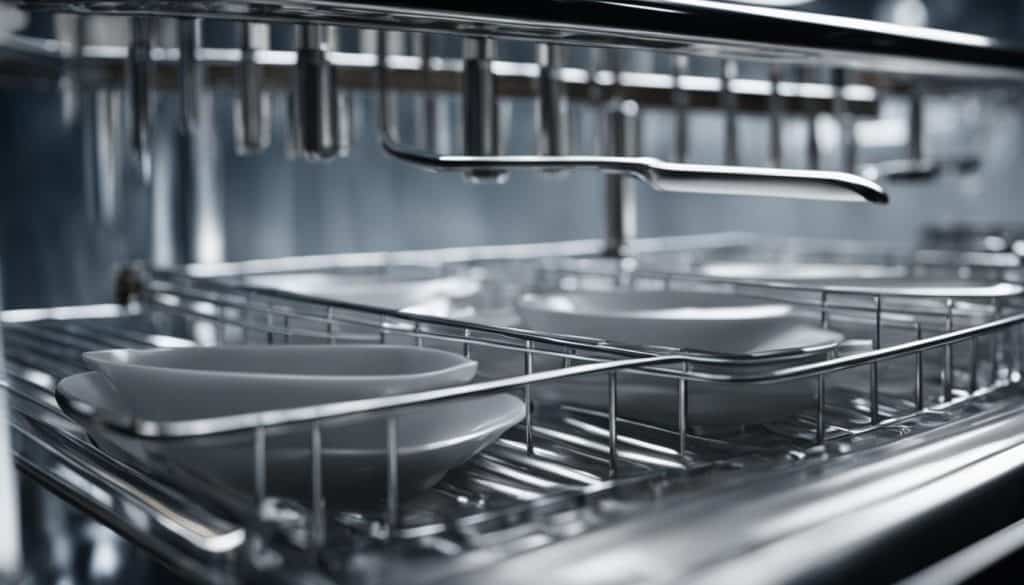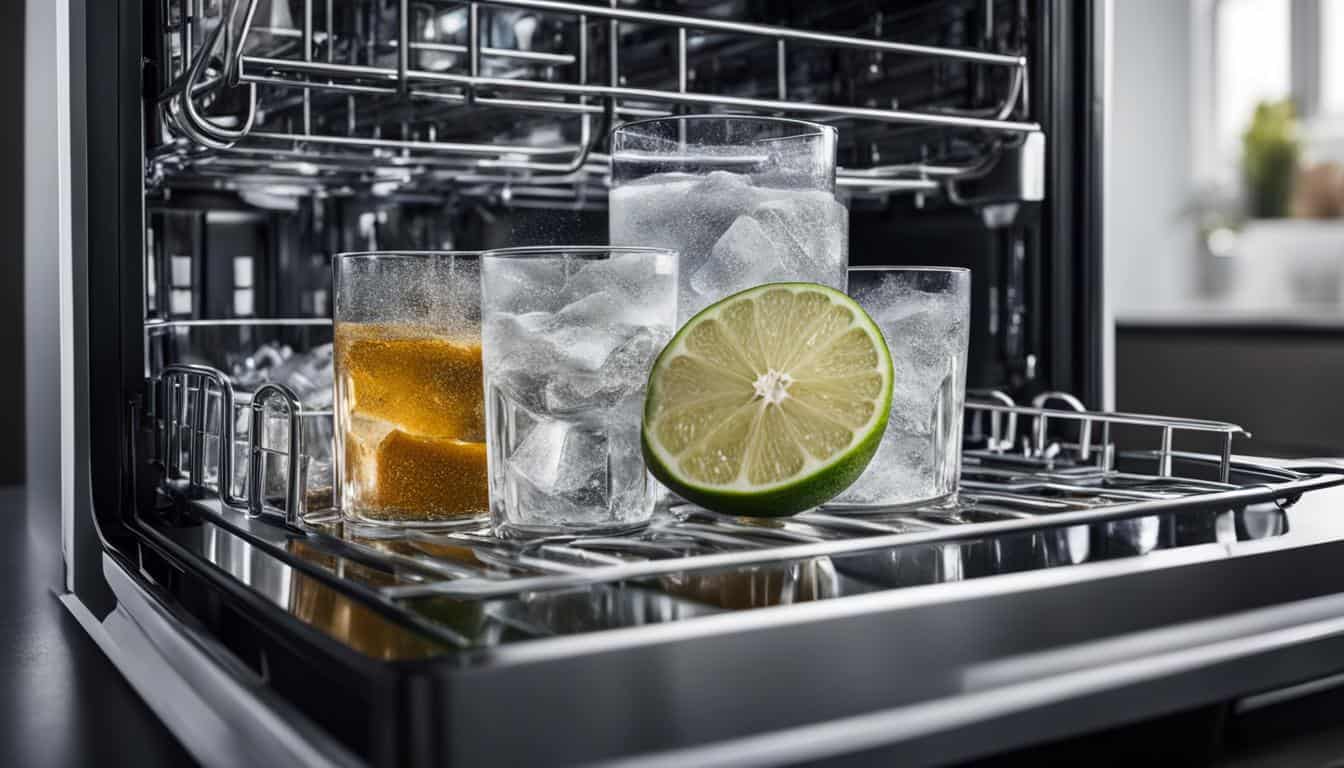Dealing with Hard Water and Dishwashers can be a real head-scratcher, right? If you’ve ever opened your dishwasher and found your glasses looking foggy, or your dishes still kinda dirty, you’re not alone.
It’s like having a bath, but coming out feeling just as grubby! That’s the pesky work of hard water. But fear not, I’ve got some cool tricks up my sleeve!
First up, let’s chat about water softeners. Imagine them as superheroes that tackle the minerals in hard water that love to mess with your dishwasher. Next, there’s this magical potion called vinegar – oh, it’s just wonderful!
A little splash of vinegar can help your dishes shine like the top of the C ysler Building! And don’t forget rinse aids; they’re like the best friend your dishwasher never knew it needed.
But wait, there’s more! Ever heard of mineral buildup? That’s like the villain in our story, leaving yucky residue on your dishes. Choosing the right detergent types is like picking the right armor to fight this villain.
And let’s not forget about maintenance tips. Keep your dishwasher in tip-top shape, and it’ll thank you by keeping your dishes sparkling. Also, your home’s plumbing and water filters play a big role too – they’re the unsung heroes in this epic battle against hard water!
So, there you have it – a little insider knowledge on tackling hard water in your dishwasher. It’s all about knowing the right tricks and treating your dishwasher with a bit of TLC. Remember, a happy dishwasher means happy dishes, and happy dishes mean a happy you!
Use a Rinse Aid
If you’re dealing with hard water, using a rinse aid is essential. Rinse aids break down the surface tension of water, preventing water spots on your dishes and enhancing the overall performance of your dishwasher.
When added to your dishwasher’s rinse cycle, they can significantly improve the rinse process, ensuring that all detergent residues are removed from your dishes.
Rinse aids reduce the adhesion of water droplets to your dishes, allowing water to drain more freely and preventing spots. They also ensure that your dishes are evenly washed, which can be challenging in hard water conditions.
While many dishwasher detergents have rinse aid components, it’s always recommended to add an additional rinse aid for the best results.
To use a rinse aid, add it to the designated dispenser in your dishwasher as per the manufacturer instructions. Ensure that you’re using a rinse aid suitable for hard water conditions. Regularly check the dispenser and refill it when necessary to maintain consistent rinse aid usage.
Adjust the Detergent Amount
When dealing with hard water and dishwashers, it’s important to adjust the amount of detergent used. Hard water requires more detergent to effectively clean dishes, but using too much can cause problems, such as leaving residue and buildup.
Check your dishwasher manual for the recommended amount of detergent to use in hard water conditions. You may also need to experiment with different amounts to find the right balance.
Tips for adjusting detergent amount:
- Start by reducing the amount of detergent you typically use and see if that improves cleaning performance.
- If you’re still experiencing issues, gradually increase the amount of detergent until you find the right balance.
- Consider using a detergent specifically formulated for hard water. These detergents are designed to work in harsher conditions and can help prevent mineral buildup.
By adjusting the detergent amount and finding the right balance, you can enhance the cleaning power of your dishwasher and prevent problems caused by hard water.
Clean the Dishwasher Filter Regularly
If you’re experiencing reduced performance from your dishwasher, the problem could be as simple as a dirty dishwasher filter.
Regular cleaning of your dishwasher’s filter is essential to maintain optimal performance, particularly in hard water environments where mineral buildup can easily occur. Over time, food particles and debris can accumulate and clog the filter, preventing water from circulating effectively and leading to poor cleaning results.
To keep your dishwasher running smoothly, aim to clean the filter at least once a month. Begin by reviewing your dishwasher manual to familiarize yourself with the cleaning process, including any recommended products and techniques.
Most filters can be removed easily by hand and washed with warm, soapy water. Be sure to clear away any visible food particles or debris before washing, and rinse the filter thoroughly to remove any soap residue. Finish by placing the cleaned filter back into the dishwasher, taking care to reassemble it correctly.
By simply cleaning your dishwasher’s filter regularly, you can prevent food particles and debris from affecting your dishwasher’s performance, ensure better cleaning results, and extend the lifespan of your dishwasher.
Run a Hot Water Cycle Occasionally
If you have hard water, mineral deposits can build up in your dishwasher over time and reduce its effectiveness. Running a hot water cycle once a month without dishes can help dissolve these mineral deposits and improve your dishwasher’s performance.
To run a hot water cycle, simply set your dishwasher to the hottest setting, and let it run empty. This will help break down and remove any mineral buildup inside the machine. Remember to consult your dishwasher manual for specific instructions on running a hot water cycle.
Tip: Always use hot water when running your dishwasher to avoid mineral buildup caused by hard water.
Use a Commercial Dishwasher Cleaner
If you’re dealing with particularly hard water, it may be time to bring in the big guns: commercial dishwasher cleaners. These cleaners are specifically formulated to remove mineral deposits caused by hard water and can help enhance the performance of your dishwasher.
When choosing a commercial dishwasher cleaner, look for one that is designed to remove mineral buildup and prevent future deposits. Follow the manufacturer’s instructions for safe and effective use.
Tip: Regular use of a commercial dishwasher cleaner can help prolong the lifespan of your dishwasher and save you money in the long run.
Try a Vinegar Rinse
If you’re looking for a natural and cost-effective solution to dissolve mineral deposits caused by hard water, consider trying a vinegar rinse. This simple process can help you improve the effectiveness of your dishwasher and keep your dishes looking clean and spotless.
To use a vinegar rinse, start by adding white vinegar to the dishwasher’s rinse aid dispenser. You can also add it to the bottom of the dishwasher if your model doesn’t have a dispenser.
Then, run a normal wash cycle with hot water. The vinegar will work to dissolve mineral buildup caused by hard water, leaving your dishes clean and shiny.
Experts recommend using a vinegar rinse once a month to prevent mineral buildup in your dishwasher. Remember to avoid using vinegar with certain types of dishes, such as those made of cast iron or aluminum, as it can cause damage.

Consider a Water Softener
If you live in an area with very hard water or have a particularly stubborn problem with mineral buildup in your dishwasher, it may be worth considering installing a water softener.
A water softener is a device that removes minerals from the water before it enters your plumbing system or dishwasher, helping prevent damage and buildup caused by hard water.
While a water softener can be a significant investment, it can save you time and money in the long run by improving appliance performance and reducing the need for repairs. Additionally, it can improve the quality of your water for other uses, such as showering and laundry.
If you’re considering a water softener, be sure to research different models and consult with a professional installer to find the best option for your household’s needs.
Load Dishes Correctly
Properly loading your dishwasher is key to ensuring that your dishes get clean and that water circulates evenly, especially in areas with hard water. Here are some tips to help you load your dishwasher correctly:
- Space your dishes out evenly so that water can reach all surfaces.
- Place glasses and cups between the tines rather than on top of them to prevent water spots.
- Load silverware with the handles down so that the water can rinse the food debris off the eating surfaces.
- Place larger items like pots and pans on the bottom rack, facing the center of the dishwasher for better water distribution.
By following these tips, you can improve water circulation in your dishwasher, leading to cleaner dishes even in hard water conditions.

Use the Right Detergent
Choosing the right detergent is critical when dealing with hard water in your dishwasher. Look for a product formulated for hard water to ensure optimal performance. These detergents contain ingredients that work to combat mineral buildup and prevent spots and streaks on dishes.
Be sure to check the label for specific instructions on how much detergent to use based on water hardness levels in your area. Using too little detergent won’t get dishes clean, while using too much can leave a residue on dishes and in the dishwasher. Following these guidelines will give you the best results for sparkling clean dishes every time.
Benefits of Using a Formulated Detergent
| Benefits | Non-Formulated | Formulated for Hard Water |
|---|---|---|
| Cleaning Performance | May leave residue or spots on dishes | Effectively combat mineral buildup and prevent spots/streaks |
| Overall Performance | Poor | Optimal, enhancing dishwasher efficiency |
| Efficiency, Cost-Effectiveness | More detergent and cycles required to achieve desired results | Requires less detergent & shorter cycles = saves money |
Be Patient in Finding the Right Combination of Strategies for Your Dishwasher and Hard Water
If you’re struggling with hard water and its effects on your dishwasher, it’s important to remember that finding the right solutions can take time.
Don’t get discouraged if the first strategy you try doesn’t work. Instead, keep experimenting with different combinations of tips until you find the right one for your specific situation.
It’s also important to remember that what works for one dishwasher might not work for another.
Variables such as water hardness and dishwasher model can play a significant role in how effective certain strategies are. So, it’s essential to be patient and keep trying until you find the right combination that works for you.
By implementing the right strategies for your dishwasher, you can prevent mineral buildup, enhance dishwasher performance, and ensure that your dishes come out sparkling clean every time. So, don’t give up, and keep trying until you find the perfect combination of tips to combat hard water, and achieve a spotless dishwasher.


